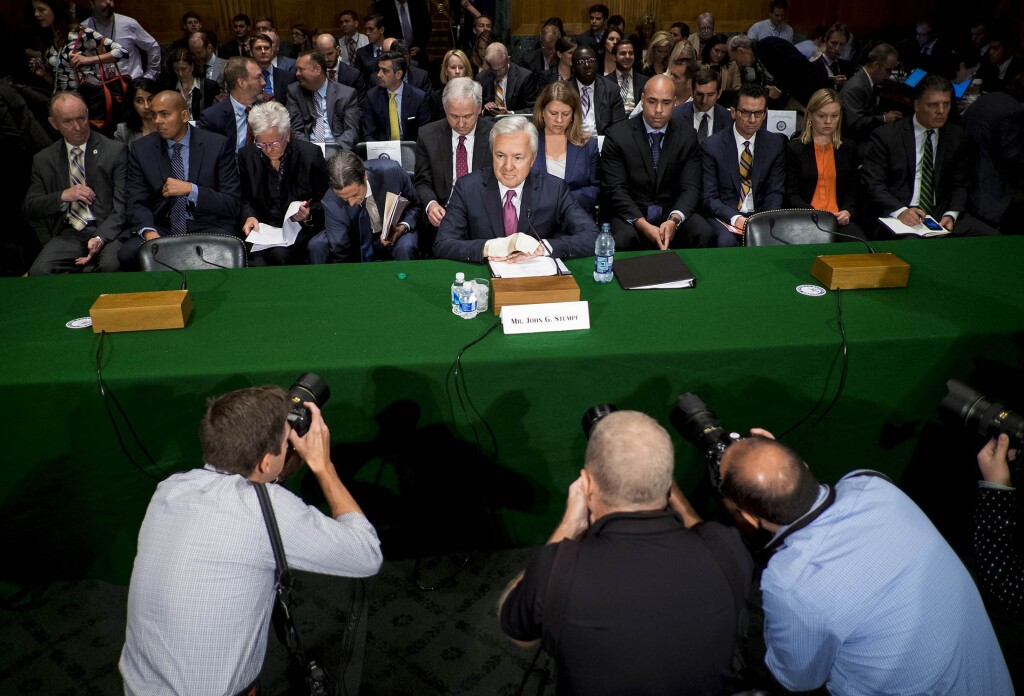The
Julian, whose seven years as the bank’s chief auditor overlapped with the sales-abuse mess, said he was pushed into early retirement at age 58. Then for more than five years, he waged a legal showdown against the bank’s main regulator.
Initially, the Office of the Comptroller of the Currency sought a $2 million penalty. After Julian refused to settle, the agency
Finally, early this year, the OCC’s acting head moved to impose
Julian, who splits his time between North and South Carolina, kept quiet publicly throughout the legal saga. But in an interview last week, he spoke at length about both his expensive fight with the OCC and his views on who bears responsibility for the
Julian was highly critical of the OCC, arguing that the agency targeted him in order to distract from its own failures in supervising
He also accused the OCC of adding $5 million to his proposed fine as retribution for his unwillingness to follow the path paved by other former
“It was retaliation for me not being willing to settle,” Julian told American Banker. “100%.”
Julian expressed some mixed feelings about his recent decision to resolve the case for a relatively paltry sum, saying he would have preferred to have won vindication in court. But had he continued the fight, he said, he probably would have prevailed on what he called a legal technicality, before there was a substantive ruling about his role in events that took place more than eight years ago.
“For the OCC to settle at 1.4%, hopefully most people read that and say, ‘Man, they never had a case,'” Julian said.
“You can’t fight the government,” he said. “They’re willing to waste tens of millions. This could have gone on for seven more years. And at this point, I wasn’t willing to do that. And I’d rather take what I saw — what I hope most people see — as a win.”
An OCC spokesperson said in an email that the agency’s enforcement action against Julian “was warranted and fully supported.”
“This is consistent with the OCC’s actions against all the other former senior
The OCC spokesperson also pointed to a September 2016 email that Julian sent to a co-worker, in which the audit chief acknowledged that he didn’t think the department had tested for certain sales-related activity in the bank’s retail unit.
“What the OCC failed to provide was the testimony and documents supporting the work Audit performed related to Sales Quality issues,” Julian said in an email, while also pointing to actions he took as the Audit Department’s head.
‘With the benefit of hindsight’
Julian, who became
In an April 2017 report, a special committee of
In May 2018, Julian sat for a deposition, where an OCC lawyer asked him questions.

Bloomberg
During that testimony, Julian stated: “I’m not saying that Audit did enough. I’m not making the excuse that, at the time, we did what was appropriate because we wouldn’t be here, we being the company, potentially if we had done more.”
Julian also said: “I’ve never heard anyone within Audit state that we shouldn’t have done more, especially given everything that is known.”
Last week, in response to American Banker’s request for comment, the OCC’s spokesperson pointed to Julian’s own words from 2018.
In an email, Julian pushed back against the suggestion that he fessed up seven years ago.
“Whether or not some member of the 1,100-member audit department erred in his or her performance of an audit has nothing to do with whether I fulfilled my supervisory duties,” he told American Banker.
“I never stated that I, as Chief Auditor, did not perform my role appropriately. To the contrary, I provided numerous documents and testimony to support that I fully and completely performed my duties.”
Julian also said that his earlier comments hadn’t implied that members of the Audit Department failed to perform their roles appropriately, based on the information they had at the time. “In 2018, when I made this statement, it was with the benefit of hindsight,” he said.
Five months after Julian testified to the OCC,
Julian told American Banker that he was placed on leave for roughly a year and that he was paid during that time because the bank’s top brass saw him as part of the solution to the sales misconduct fiasco, not part of the problem.
Then in October 2019, Charlie Scharf took over as
To defend himself, Julian retained the high-priced law firm WilmerHale. At the time, his attorneys said the OCC’s charges were based on hindsight and they were looking forward to clearing Julian’s name at a trial.
‘Pin the tail on the wrong donkey’
A hearing before an administrative law judge is, in important ways, unlike a trial in a federal court.
Administrative law judges, who are employed by regulatory agencies, lack at least some of the independence that federal judges enjoy. And in their courtrooms, it can be easier to admit hearsay into evidence than it is in federal court. It can also be easier to designate witnesses as experts.
These differences have contributed to a perception among defense lawyers that the playing field is tilted against their clients.
The administrative law system has come under attack in recent years. Last summer, the Supreme Court issued

Bloomberg
In late 2021, Julian got a hearing before an administrative law judge, Christopher McNeil. During the same months-long hearing, the OCC also made its case against two other former Wells executives — Executive Audit Director Paul McLinko and Community Bank Group Risk Officer Claudia Russ Anderson.
The OCC’s case against Julian relied largely on the testimony of the agency’s examiners. They were designated as hybrid witnesses, who could testify about the facts and also as experts.
The OCC employees arguably had a self-interest in heaping blame on former Wells executives. The Senate Banking Committee, which was chaired in 2016 by Richard Shelby, R-Ala., had been looking into what the bank’s regulators knew — and what actions they took — before the scandal broke.
In April 2017,
Julian said he believes he was targeted by the OCC as part of an effort to distract from the agency’s own failings. “I’m 100% convinced that it was to mask and hide the fact that they did poor work,” he told American Banker.
He later added: “Judge McNeil wouldn’t allow us to bring any evidence into the trial, into the record, about what the OCC knew, when they knew it, what they did about it, because he claimed it was irrelevant.”
Julian alleged that McNeil made numerous biased rulings that went in favor of the OCC. “Keep in mind who hired and paid for him,” Julian said.
As one example of McNeil’s alleged bias, Julian noted
“Management is the issue,” the OCC examiner wrote, “as is weak corporate oversight over cross sell/sales practices. It is not the failure of Audit to provide satisfactory coverage.”
“By continuing to point our focus at Audit we are effectively giving management a ‘free ride’ and we are trying to ‘pin the tail’ on the wrong donkey,” the examiner wrote.
McNeil, who recommended the $7 million fine against Julian in late 2022, retired a short time later. When asked last week for his response to Julian’s criticism, McNeil wrote in an email: “I’m retired and not sufficiently versed in the matters you’ve described, so I must decline comment.”
Julian is not the only former Wells executive to settle with the OCC for far less money than the agency had previously been seeking. Last month, the OCC announced a $50,000 settlement with McLinko, down from a $1.5 million penalty it imposed three months earlier.
“We have said from the beginning that Mr. McLinko did nothing wrong,” McLinko’s lawyers at Coblentz Patch Duffy & Bass said in an email, “and that he would be vindicated once he had the chance to make his case before neutral judges.”
“The OCC at last was faced with making its case before a federal court, and it decided to settle. At a time when he should have been enjoying retirement, Mr. McLinko has spent the last five years and more fighting the government through this exhausting process. He is looking forward to focusing full-time on his family and his community,” the lawyers said.
The OCC’s case against Russ Anderson is continuing. After the agency hit her in January with a $10 million penalty and a ban from the banking industry, her lawyers filed a petition for review by the Eighth Circuit Court of Appeals.
‘They dragged it on for seven years’
The fallout from
Julian puts the onus on low-level employees who cheated in an effort to meet their sales goals. “I don’t happen to be a believer that you’re forced to do the wrong thing,” he said.
Still, Julian does not absolve Carrie Tolstedt,
“Now, were sales goals challenging? No doubt,” Julian told American Banker. “I can’t speak to what the line of business and Carrie Tolstedt knew. I never had the opportunity to bring her to the witness stand.”
“I don’t know what she knew. She led the business. She set the sales goals.”
Tolstedt was the only
Julian was also critical of politicians who, in his view, fanned the flames of the
But Julian saved his sharpest words for the OCC. He was only able to wage the fight, he said, because his legal bills were paid by
“Most people don’t have corporate insurance to pay their legal fees,” Julian said. “It would have been easier seven years ago to settle, right? If it was coming out of my own pocket, I would have had no choice. And they know that. You’re stuck in the administrative process, and they can drag it on. They dragged it on for seven years, hoping I would give in.”
In the OCC’s final decision against Julian, then-acting Comptroller Michael Hsu wrote that the size of the agency’s case against the three former Wells executives was “unprecedented.”
Both sides put an enormous amount of work into the case. As one example, lawyers for Julian, McLinko and Russ Anderson filed briefs in response to the administrative law judge’s recommended decision that added up to more than 6,000 pages.
Collectively, the three former executives’ legal defenses likely cost many tens of millions of dollars — and possibly topped $100 million. And that estimate does not include the OCC’s costs.
“Think about how much the regulators paid to keep this case going, because they could, it was in their own court system,” Julian said. “I believe, certainly, once it got into federal courts, the regulators knew they were going to lose this, and wanted it done.”

